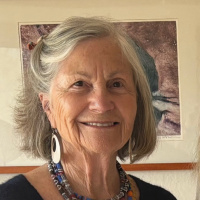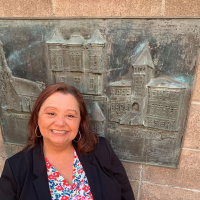
Rose asks Alex Stillman, Kimberley White, Edith Rosen, Dana Quillman, Chase Marcum, Humnath Panta…
Downtown Arcata Health and Safety Issues
What would you do to address homelessness in Arcata? I am specifically interested in health and safety needs for both the unhoused population and others who conduct business in Arcata. (Safe places to sleep, trash collection, hygiene and mental health services are areas I’m interested in, but I would like to know your thoughts)
— Rose
Responses

Alex Stillman
I have supported the efforts of Arcata House Partnership since its inception in 1991. I would suggest, we as citizens donate to AHP. I was thinking if everyone gave at $20. a year and considering a population o f 17,000, they would receive about $340,000 a year to add more services which might be out reach. You can look up on line the current services they provide. AHP has done a tremendous job and I feel lucky to have them. Thx for the question.

Edith Rosen
Thank you for your concern, Rose.
To address homelessness –houselessness in Arcata, I approach this issue with compassion and understanding. Compassion for each other, for our community, and for us all. With the understanding that houselessness is multifaceted and intertwined within systemic issues woven into our society, we must be certain that the people that need help, not only have the resources–that they actually have access to the resources in order to heal, along with their basic needs being met. Just as the issue is multifaceted, so too must be the solution. I will work to improve access and reduce boundaries to social services and resources, assisting those who need it most. I will work to restore a sense of safety and security within our community. I will work with our local business owners, City staff, and concerned citizens to address this issue as a community, as a team–with compassion and with understanding.

Kimberley White
Rose, thank you for bringing to light that we can no longer ignore the downtown Arcata health and safety issues or anywhere else in Arcata that impact both the unhoused community and those who are conducting business in Arcata. I propose long term solutions with dignity and respect for the unhoused community and ways to address the challenges that businesses currently face as well.
Most of the candidates say if elected, they will advocate for the homeless. In my now 18 years living in Valley West, I have never missed bringing a holiday meal to our unhoused community. I have been advocating for the unhoused community my entire 30 plus years living in Arcata. I could be wrong, but I have yet to see a single candidate actually in the trenches. I have never seen a candidate down in the encampments feeding the unhoused nor participating in any of the park cleanups, community sidewalk cleanups, or trash cleanups. I am involved not only in bi-monthly but also weekly community trash clean ups as well. I am involved in setting up Free Little Pantries in the community to address food insecurity. I am involved in not only winter clothing drives but help with gathering clothing donations to give directly to the unhoused community year round. I am both an advocate and community volunteer. Many in the unhoused community know me by name, and I know them by name, and their story as well. Long before there was an open seat for Arcata City Council, I wrote a two part series on the faces of the unhoused in the Mad River Union newspaper (Valley West: Daniel and Lonnie’s real-world chutes and ladders - Mad River Unionand Faces of the Unhoused: His name was Pops - Mad River Union). It is easy to say as a candidate, what you will do if elected, but a better question is what are they doing now for our Arcata community?
I am currently an Arcata Planning Commissioner and have had the honor of serving for the last three years. I am running for city council to continue public service and pursue my passion of helping others overcome housing barriers and to be a voice for those who seemingly have been left out and have had no voice. With COVID 19 the disparities have come to light more than ever. It is essential to have a well functioning democracy that ALL voices be heard. It is my goal to make sure our most vulnerable populations have equal access. As Dr. Martin Luther King Jr. aptly put it, “It is not possible to be in favor of justice for some people and not be in favor of justice for all people.”
My passion is housing. While we need more housing, equally important is equal access. While looking at causes of the unhoused it is essential that we also look at the connection between affordable housing and homelessness. It is essential to address issues of equity and social justice and how disparity permeates through affordable housing and the unhoused.
First let me say, we need to rethink social policy. What the unhoused really need is a sense of community. It is about community, collaboration and commitment. A little compassion can also go a long way. I really do not want to give much lip service to a camp or tent city. I believe that permanent housing is a solution rather than shelters, encampments, tent cities, safe parking, etc. These are all temporary solutions and they never seem to go any farther. A shelter is just that, a temporary shelter.
Regardless of why someone is on the streets, putting a roof over their head will give the stability needed to improve their life. In other words, housing first. Without housing it is unlikely that any other solutions will work. By providing housing you give the unhoused a fighting chance to improve their lives.
As we address issues of the unhoused I want to point out that while it is essential to have a roof over one’s head, it is just that, a roof. It needs to extend beyond a roof. It is essential to have a sense of community, a sense of purpose, and a sense of control of one’s destiny.
Now we are in the midst of the controversial Gateway Plan which will decide what Arcata is going to look like moving forward, but I do not see any supportive homeless housing or any housing for the unhoused community for that matter. As I shared earlier, what the unhoused really need is a sense of community. It is important to not segregate the unhoused all in one neighborhood. For one, it will not serve the target population as we all know the outcomes of segregation and the residents will resent the unhoused community if all the unhoused are “warehoused” so to speak, all on one city block. This all goes back to what the unhoused really need is a sense of community. They want to feel like they belong. It is essential every neighborhood share responsibility for those who are disenfranchised.
Those with mental health issues or loners face a bigger financial challenge in getting off the streets having to come up with first and last or first and a deposit in advance. This makes it nearly impossible to get off the streets unless they can find steady employment. It becomes a vicious cycle, in order to find stable employment one needs housing, and in order to find housing one needs stable employment. Many cities have come up with ways to employ the unhoused community. The City of Arcata is looking to implement such a program, the community ambassador program, funded by ARPA funds (American Relief Program Act). This program has a long term goal of eventually employing up to 10 unhoused individuals to be part of the solution.
There simply is no one size fits all. While some programs are successful with certain populations or a community, it may not work at all in another. Critics often say nothing works, but in reality we really do not know which services or programs are working. Perhaps lies the answer in having the unhoused weigh in and evaluate what works for them. When contracting for services the client rarely is involved in the decision making on what programs they receive. They do not get the option to shop around or choose. Rather than thinking they do not want help, perhaps it is not wanting or needing the services or help being offered. We could save a lot of guesswork and money by eliminating services that the unhoused have deemed unhelpful or worthless. I know, how dare the unhoused weigh in on their own lives.
What are some possible solutions for the unhoused? One solution is a tiny home community. Humboldt County passed a new housing law on Tiny Housing. I work for Cooperation Humboldt. Recently,our transition housing circle in collaboration with the City wrote a grant to assist in relocation of 20 plus individual encampments to a micro housing community on City property that will allow the unhoused community to remain in the same community where they have been living. It was a highly competitive grant and while this particular grant was not awarded it is essential that we continue to pursue such opportunities every time they avail themselves.
There are many examples of tiny house communities that are successful. I also have been following container homes, if done right, are incredibly affordable. There are similar housing projects that have worked. A Community First Village in Texas is a great example of what is possible when everyone works together. Oahu moved forward in resolving their unhoused community after receiving a donated 20- acre parcel.
These communities are self-sustainable where everyone pays rent and has an investment in the community. It is about a sustainable community that gives everybody dignity and a reason to get up in the morning. Examples of sustainable communities include various onsite resources such as auto shops, bicycle repair, cooking classes, community gardens, basic budgeting and finance workshops, vocational and employment workshops, carpentry and wood shop, on-site childcare, a lending library, a grocery store, and more. Also they could include social services, counseling and mental health care, substance abuse and alcohol on site programs, clean and sober recovery programs as well as a mobile health/dental unit visiting the site regularly.
We live in a throwaway society and I’m not just talking about what’s going into our landfills, but human beings. We are our brother’s keeper and I think that it’s time that we reach out to the unhoused community with real solutions. When you give somebody a task and you expect the best of them, you give dignity back and a reason to keep trying. To give back respect, give responsibility, a sense of dignity and control over one’s life, is the most compassionate way to help the unhoused to truly begin to reintegrate into society.
